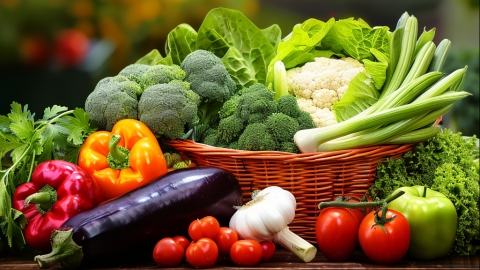Which vegetable is most feared for causing constipation?
Generally speaking, there is no specific vegetable that is considered the most effective for treating constipation. However, individuals suffering from constipation can benefit from consuming appropriate amounts of vegetables such as celery, spinach, Chinese chives, broccoli, and pumpkin. These vegetables help promote intestinal motility and improve bowel movements. For those seeking relief from constipation, it is recommended to incorporate these vegetables into the diet according to personal taste preferences. A detailed explanation is as follows:

1. Celery: Celery is rich in dietary fiber, especially insoluble dietary fiber, which increases stool volume, stimulates intestinal motility, and accelerates the transit of stool through the intestines, helping to relieve constipation caused by hard stools or insufficient intestinal motility.
2. Spinach: Spinach is cool in nature and contains abundant dietary fiber and plant mucus. The dietary fiber promotes intestinal motility, while the plant mucus lubricates the intestinal walls, reducing friction between the stool and the intestinal lining, thus facilitating easier bowel movements. It is suitable for regular consumption by individuals with constipation.
3. Chinese Chives: Chinese chives contain a large amount of coarse fiber, which is relatively rough in texture. This fiber effectively stimulates intestinal motility, enhances digestive and excretory functions of the intestines, and provides good support for improving habitual constipation. However, it should be consumed in moderation to avoid excessive irritation to the stomach and intestines.
4. Broccoli: Broccoli is not only rich in dietary fiber but also contains various vitamins and minerals. The dietary fiber promotes intestinal motility and softens the stool, while the vitamins and minerals help maintain normal intestinal physiological functions, aiding in the improvement of constipation and supporting overall intestinal health.
5. Pumpkin: Pumpkin contains abundant soluble dietary fiber and pectin. Soluble dietary fiber promotes intestinal motility, while pectin absorbs water in the intestine, softening the stool and increasing its volume, making bowel movements easier and smoother. It is suitable for consumption by individuals with various types of constipation.
In daily life, besides consuming these vegetables, it is also helpful to increase fluid intake, aiming for 1500-2000 milliliters per day. Combining this with moderate physical activity, such as brisk walking or jogging, can further stimulate intestinal motility and improve constipation. Additionally, maintaining a regular sleep schedule and avoiding late nights also contributes to the normal functioning of the intestines.






